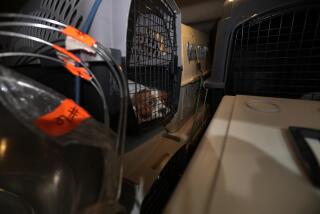Card craze turns mutts into drug war’s top dogs : Photos of the Customs Service’s canine corps are a hot item among children, collectors.
- Share via
NOGALES, Ariz. — They have names like Bandit, Roscoe, Zoom and Silka, and they are the new superstars in law enforcement’s war against drugs along the Mexican border.
Make that superstar dogs, drug-sniffing pooches that are part of the U.S. Customs Service’s canine enforcement program. Like their human counterparts, the dogs have been working their posts in relative anonymity since the early ‘70s.
But that low profile changed radically late last year when the Customs Service, in a public relations effort designed to interest children in the anti-drug campaign, began printing and distributing baseball-style cards featuring photographs of the dogs at work.
Since then, these furry drug cops have become heroes to children living along the border, and the cards are being hotly collected, traded and sold, in some cases for a lot of money.
“We never expected anything like this to happen,” said T.J. Toenjes, the Customs Service’s canine enforcement supervisor for the Nogales district. “We printed over a million of the cards, and we’re running out fast. Some people are using them to make money, and that’s not what they’re intended for. But at least they’re getting around.”
Toenjes says one collector in Chicago is offering $500 for a full set of cards--81 dogs depicted in packs of nine, with nine packs to a set.
At swap meets in Tucson, entrepreneurs sell cards to the highest bidder. Children in Nogales prowl the streets with cards in their pockets, looking to make trades.
But unlike baseball cards, the value of each dog card does not hinge on the output of home runs and RBIs. What matters here is the animal’s drug-seizure record.
Word on the street is that if you have a Silka, hang on to it because when it comes to nosing out narcotics, the 6-year-old Labrador retriever and ridgeback mix is as much an MVP as Jose Canseco.
As with all the dogs, Silka’s statistics are printed on the back of his card. The information includes age, breed, weight and the year his Customs Service career began.
Under the category of largest or most notable seizure, Silka’s card records an impressive roster: “In five years, Silka has piled up seizures which included 10 pounds of heroin woven into carpets, 300 pounds of opium, 120 pounds of cocaine, 700 pounds of marihuana and $5 million in drug money.”
The front of each card is bordered by stars and includes the dog’s name in bright pink letters below the official Customs Service seal. The color photos depict bright-eyed stares, flopping tongues and perked ears.
Many are action shots, showing the dogs biting and scratching at car bumpers, gas tanks, tires, seat cushions and trunks. Others have a more regal air, such as the shot of Bernie, a 4-year-old golden retriever, gazing out the window of a vehicle he has just sniffed.
But the surprising popularity of these lovable mutts has created problems for the Customs Service. “The manpower we need to keep up with the demand is intensive,” Toenjes said.
An average of 150 letters a week pour into Customs Service headquarters in Nogales. Toenjes stashes the envelopes on a crowded shelf in his office overlooking the busy border crossing and wonders when he will find time to respond to them all.
Toenjes also answers dozens of phone calls form school districts, anti-drug groups and TV stations asking if the dogs have the time to make an appearance to demonstrate their ability.
“I got nine phone calls in one day asking us to give a dog demo and to bring some cards along,” he said.
Most of the interest comes from children. “A lot of them already have some cards but want more to complete a set,” he said. “A few ask if the cards come with bubble gum.”
Local schoolchildren have paraded into Toenjes’ office, pens and notebooks in hand, to gather information for class assignments.
He hears from adults too. One letter came from a grandmother who wanted cards to give to her grandchildren. Another was from an inmate who asked for cards for his two sons, hoping the anti-drug message will keep them from following in his footsteps.
The card program, which began on a trial basis in Arizona, New Mexico and Texas, will soon go national. As part of the expansion, the Customs Service is considering putting out a super-dog line, cards depicting those dogs with the best seizure records.
For Toenjes, a larger program will probably mean more letters in his already bulging stack.
More to Read
Sign up for Essential California
The most important California stories and recommendations in your inbox every morning.
You may occasionally receive promotional content from the Los Angeles Times.










